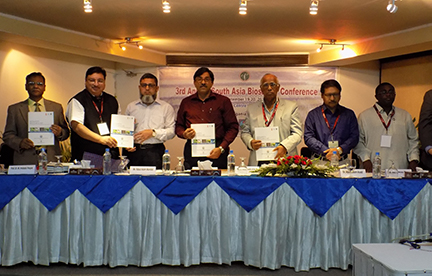3rd Annual South Asia Biosafety Conference
-

September 19, 2015-September 20, 2015
9:00 am - 6:00 pmBRAC Centre Inn
Dhaka, Bangladesh
The South Asia Biosafety Program (SABP), the Agriculture & Food Systems Institute, the Bangladesh Academy of Sciences, and the Biotech Consortium India Limited (BCIL) organized the 3rd Annual South Asia Biosafety Conference in Dhaka from 19-20 September 2015. The conference was supported by the National Academy of Agricultural Sciences, India, Bangladesh Agricultural Research Council, and Department of Environment, Government of Bangladesh. The objective of the conference was to provide an unparalleled opportunity for scientists, regulators, and policy makers in South Asia to meet and discuss issues relevant to the risk assessment and regulation of genetically engineered (GE) organisms with a regional focus. The conference additionally provided an opportunity to hear from leading scientists representing regulatory agencies, public sector research institutions, and the private sector in South Asia and internationally.
Agenda
Program Overview
The conference featured sessions on:
- Perspectives on the Regulation of Biotechnology in South Asia
- Nutritionally Enhanced Crops and their Safety Assessments
- Biotechnology and Climate Change: A Response to Pests, Diseases and Abiotic Stress
- Biotechnology Research in South Asia
- What Happens After Release: Stewardship and Monitoring
- Considerations for International and Regional Harmonization
Plenary Session I: Regulation of Biotechnology in South Asia
Update on Biosafety Regulation in Bangladesh
Mr. M. Solaiman Haider, Department of Environment, Bangladesh
Update on Biosafety Regulation in India
Dr. Manoranjan Hota, MoEF&CC, India
Update on Biosafety Regulation in Pakistan
Ms. Sameerah Yunis, Pakistan Environmental Protection Agency, Pakistan
Update on Biosafety Regulation in Sri Lanka
Mrs. R.H.M.P. Abeykoon, Ministry of Mahaweli Development and Environment, Sri Lanka
Update on Biosafety Regulation in Bhutan
Ms. Tashi Yangzom,Bhutan Agriculture and Food Regulatory Authority, Bhutan
Parallel Session I: Nutritionally Enhanced Crops and Their Safety Assessments
What are Nutritionally Enhanced Crops, and Why Does the World Need Them?
Dr. Parminder Vik, Harvest Plus, India
Considerations for the Food Safety Assessment of Nutritionally Enhanced Crops
Dr. Donald MacKenzie, International Rice Research Institute (IRRI), Philippines
Nutritionally Enhanced Rice
Dr. Karabi Datta, University of Calcutta, India
Biofortified Sorghum
Dr. Raymond Layton, DuPont Pioneer, United States
Parallel Session II: Biotechnology Research and Development in South Asia
Potato Biotechnology Research being carried out under ABSP-II
Mr. Md. Abu Kawochar, Bangladesh Agricultural Research Institute, Bangladesh
Development of Biotechnology in Pakistan
Dr. Shaukat Ali, National Agricultural Research Centre, Pakistan
Traits for Climate Change Adaptation
Dr. Bharat Char, Mahyco Agriculture & Food Systems Institute, India
Parallel Session III: Preparing a Regulatory Dossier
Introduction to Preparing a Regulatory Dossier: Principles
Dr. Donald MacKenzie, International Rice Research Institute (IRRI), Philippines
Interpreting Regulatory Requirements: Knowing When Data is Not Necessary
Dr. Joseph Huesing, United States Agency for International Development (USAID), United States
Regulatory Testing Versus Research Experiment: Why the Data for Your Dossier is Different Than Your Thesis Research
Dr. Flerida Cariño, University of the Philippines, Philippines
Challenges for Developing a Regulatory Dossier from Public Sector Developers in Developing Countries
Dr. Vibha Gupta, Centre for Genetic Manipulation of Crop Plants (CGMCP), University of Delhi, and Dr. Vibha Ahuja, Biotech Consortium India Limited, India
Parallel Session IV: What Happens After Release: Stewardship and Monitoring
Stewardship for Off-Patent Technologies
Mr. Christopher Holdgreve, Excellence through Stewardship, United States
Post Release Monitoring of Bt Brinjal
Dr. G.P. Das, Agricultural Biotechnology Support Project II (ASBP2), Bangladesh
Design of Monitoring Studies for GE Crops
Dr. Raymond Layton, DuPont Pioneer, United States
Post Release Experience with Bt Cotton in Pakistan
Dr. Khalid Abdullah, Government of Pakistan, Pakistan
Post Release Experience with Bt Cotton in India
Dr. Vijay Kumar, Navsari Agricultural University, India
Plenary Session II: Considerations for International and Regional Harmonization
What is Harmonization, and Why Does it Matter?
Dr. Andrew Roberts, Agriculture & Food Systems Institute, United States
Fostering Harmonization through Development and Capacity Building
Dr. Alex Owusu-Biney, United Nations Environment Programme (UNEP), Kenya
Harmonization through Information Exchange: OECD’s Work and Technical Documents for Safety Assessment
Dr. Bertrand Dagallier, Organisation for Economic Co‑operation and Development (OECD), France
Harmonization through Recognition of Decisions: Vietnamese Experience
Dr. Pham Van Toan, Vietnam Academy of Agricultural Sciences, Vietnam
Harmonization through the South Asia Cooperative Environment Program
Mr. Muhammad Khurshid, South Asia Cooperative Environment Program, Sri Lanka
Facilitating Harmonization: The Work of the SAARC Agriculture Centre
Dr. Muhammad Musa, SAARC Agriculture Centre, Bangladesh
Poster Session
Conference participants were encouraged to share their work with colleagues by preparing a poster for this session. Posters were judged based on abstract, scientific content and display.
The first place winner was Md. Nazrul Islam, Sudip Biswas, Samsad Razzaque, G.M. Nurnabi Azad Jewel, Narendra Tuteja, and Zeba I. Seraj for the poster on “Constitutive Overexpression Of Rice G-Protein Beta Subunit In A Farmer Popular Rice Variety Brri Dhan-55 Confers Heat And Salinity Stress Tolerance”. The first prize consisted of a two year membership for the International Society of Biosafety Research, a USD $100 cash prize, and an award certificate.
The second place winner was U.S. Mahzabin Amin, Sudip Biswas, Sabrina M Elias, Samsad Razzaque, Taslima Haque, Richard Malo and Zeba I. Seraj for the poster on “Enhanced Salt Tolerance Conferred By The Complete 2.3 Kb Cdna Of The Rice Vacuolar Na+/H+ Antiporter Gene Compared To 1.9 Kb Coding Region With 5’ Utr In Transgenic Lines”. The second prize consisted of a two year membership for the International Society of Biosafety Research, a USD $50 cash prize, and an award certificate.
